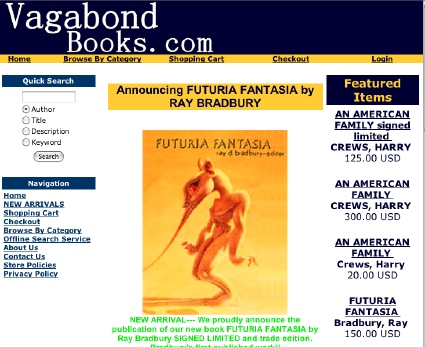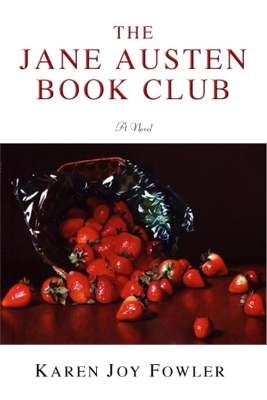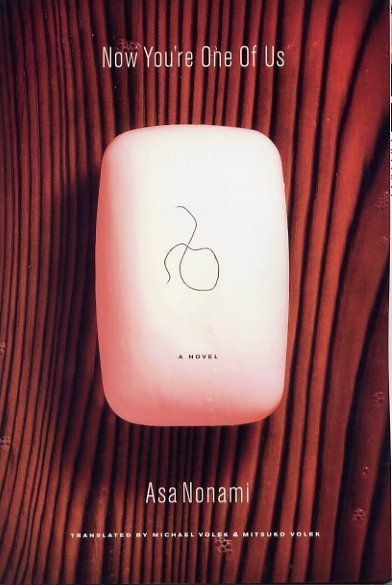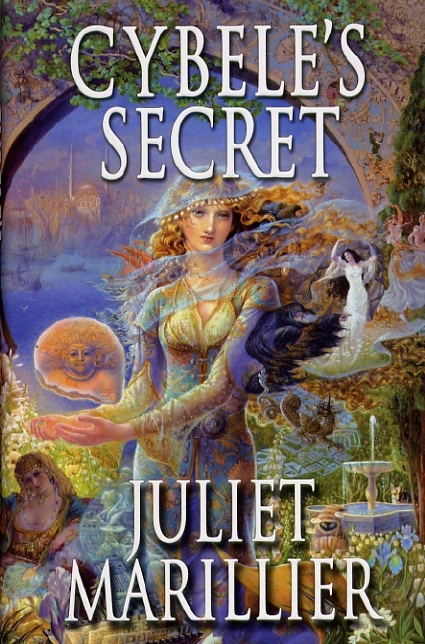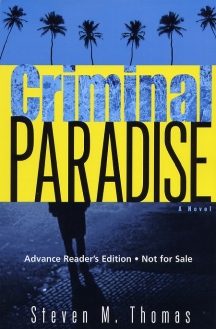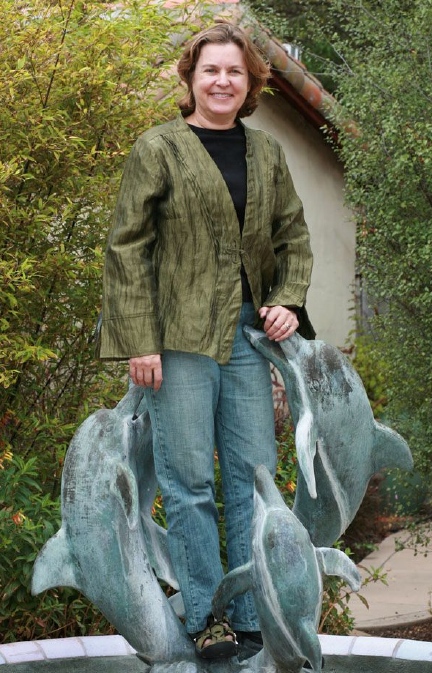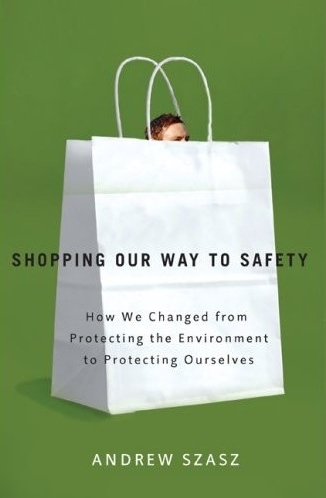|
|
|
|
This Just In...News
From The Agony Column
|
| |
|
11-30-07: 'Now You're One of Us' ; Agony Column Podcast
News Report : Craig Graham, Vagabond Books
|
Asa Nonami Joins the Family
|
|
| Cover
design by David Heasly; photo by Geoff Spear. S-c-a-r-y. |
Nothing is quite so frightening as happiness. We look at the smiling faces,
the hands being held and wonder, What the hell are those people hiding?
Unfortunately, our imaginations are happy to fill in the blanks. Cut
and paste from your favorite lurid news source, add a dash of hometown
strange,
and you've got your own private nightmare. Should you have any difficulty,
however, legions of writers are queued up to inform you. Adding a very
unsettling angle is Asa Nonami in 'Now You're One of Us' (Vertical ; November
20, 2007 ; $14.95), in which Noriko marries into the perfect family, the
Shitos. It's the nature of that perfection that rapidly comes into question.
Yes, they’re perfect – but what have they perfected?
Nonami doesn't waste time with a lot of setup. When 'Now You're One of
Us' starts, Noriko is already ensconced in the family estate, living in
a single dwelling with eight others. Her hubby adores her, her in-laws
fawn, business thrives. But not without a price. The raggedy man who approaches
her one sunny, bright morning claims asks if the rent can wait, just a
little while.
A small thing really, easily dismissed.
But the unease sets in and does not depart. Nonami is a master of the quietly
disturbing observation, and layers the novel effectively, leading the reader
deeper and deeper into a family history that bears all too close a resemblance
to actual history. Shot through with violence, sexual subjugation and unpleasant
combinations of the two. Of course everything has an explanation and our
heroine finds herself thinking "Shouldn’t I be satisfied with
that?" When you're comfortable, it's so much easier to let the facts
drift, isn’t it? It's so much easier to drift into horror.
Cults, families and the differences between the two melt as Noriko finds
her identity under assault. This is what being part of family does; it
changes you. We always assume that it's for the better, but as Noriko begins
to find out "the better" can be very easily re-defined. Nonami
twists Japanese societal norms ever so effectively, turning charm into
creep and happiness into horror. Mind, you have to enjoy the sort of embarrassing
horror genre that Nonami is writing within. The terrors are not simply
physical, but emotional; the fear of being disgraced is more powerful in
Japan than America, at least for the moment.
Vertical is offering this one as a trade paperback with a cover that is
every bit as creepy as the novel within. For fifteen bucks, you too can
experience the prose equivalent of finding a pubic hair embedded in your
bath soap. And all the seas of Araby shall never wash you clean.
|
Agony Column Podcast News Report : Craig Graham, Vagabond Books : On the Road to Perdition
|
|
| Home
sweet home for those who roam. |
Today I spoke with
the Craig Graham, owner of Vagabond
Books in Pacific Palisades, California.
I know about this bookstore because Dennis Macmillan told me about
finding
a paperback copy of 'Whip Hand' by Charles Willeford writing as Franklin
Sanders at Vagabond. So, I got on the phone and spoke with the owner
about A conversation with Craig Graham, owner of Vagabond Books, about 30 years of book culture that include James Ellroy, Ray Bradbury, Forrest Ackerman and more.
You can hear the MP3
of our conversation here. If the honorable trade
of selling books is on the road to perdition, then soon all book
stores will
be vagabonds.
|
| |
|
11-29-07: Juliet Marillier Reveals 'Cybele's Secret' ; Agony Column
Podcast News Report : Molly Gloss, Karen Joy Fowler and Terry Bisson
|
Very Well-Traveled
|
|
| We
always want a big version of a Kinuko Y. Craft cover. |
'Cybele's Secret' (Tor
UK / Macmillan ; December 14, 2007 ; £14.99)
by Juliet Marillier is a book that barely even flirted with the Rolling
Shelves. It traveled directly to a place of honor next to 'Wildwood Dancing'
(Tor UK / Pan Macmillan ; December 14, 2007 ; £7.99), now out as
a mass-market paperback. Some books really bring out the compulsive collector
in me, and these gorgeous Tor UK hardcovers are definitely in that class.
Everything about these books says, "Read me," from the Kinuko
Y. Craft covers to the Author's Notes at the end of the book. Tor UK has
done a fantastic job at packaging these books. Even though these are being
sold as "Young Adult fantasy," they look like real books. The
sort you put directly on your shelves in a place of honor.
For me, typesetting matters. So part of the appeal here is the small-press
worthy font size and leading. The words seem to leap off the page, but
not in a manner that suggests kiddie book. I can't really put my finger
on why that is; it's probably an artifact of page design and layout. Whoever
set this book did a fantastic job and deserves commendation.
But all the great covers and nice deign wouldn’t matter a whit were
it not for the essential ingredient, Juliet Marillier's writing. With these
Paula in the Other Kingdom novels she seems to have found an easy synthesis
of contemporary fantasy and fairytale myths, a way of telling stories and
stories within stories that is compelling and suspenseful for readers of
any age. When you read the book, you’re just going to experience
the seamless whole of Marillier's story. This time around, Paula travels
with her father to Istanbul to purchase Cybele's Gift, an ancient artifact
that one might presume has ties to the Other Kingdom. Perils in this world
and others pursue her; myths unfold before her eyes and she becomes enmeshed
in stories that have yet to be told as myths. Marillier keeps the suspense
high, the prose fluid and provides a complicated plot that is intricate
yet well-articulated.
So much for the plot summary. Readers of 'Wildwood Dancing' will have an
excellent idea of what’s in store for them, and you should not venture
into these secret realms without having first read that book, now conveniently
available as a mass market paperback. Now, I just did search on Bookfinder
and couldn't scare up any UK first edition hardcovers of 'Wildwood Dancing'.
It's quite possible the copies over at *.co.uk are firsts, but certainly
not guaranteed. The point being, the UK hardcovers of the first book in
the series are not so common as you might expect them to be. The point
being, you might want to snap up a couple, just to satisfy your shelf-filling
compulsions.
The most important compulsion, however is your reading compulsion, and
that's where Marillier really pays off. The prose effortlessly immerse
you in a world as jam-packed with gorgeous detail as the cover illustrations.
If you like reality to be subtly bent by a writer with serious prose chops,
then Marillier is your gal. Paula's first-person narration straightforward
when required, but filled with poetic touches that heighten the surreal
plot elements. She knows how to keep a brisk pace without forcing things.
Now, there is a proviso to all this. The main character is a teenaged girl,
so the book is by definition sort of girly. That said, it's never precious
or smarmy. There are elements of fear woven into the narrative, but you
won’t be finding far-flung body parts. Nor are there any dull epic
battle scenes. There is however, room for another sequel, so if you’re
the sort who likes to read a series cover-to-cover, back-to-back, then
just stash this one on the shelf and hope the next one comes in a timely
manner.
'Cybele's Secret' is a luxurious world of words. Immerse yourself in Marillier's
prose and you'll not want to emerge until you've undertaken the whole journey.
Happily, the books themselves, the physical objects, make this easy. Words
on bound pages, hard covers, a dust jacket. Such a deceptively simple technology.
|
Agony Column Podcast News Report : Molly Gloss, Karen Joy Fowler and Terry
Bisson : SF in SF Discussion, November 17, 2007
Today we wrap up
our coverage of the last SF in SF event with a podcast of the panel
discussion between Molly Gloss and Karen Joy Fowler, moderated
by Terry Bisson. You
can hear the whole shebang from this MP3 file. I
bought a new mic for this gig, and I think it helped enormously. Alas,
there will
be no SF in SF next month, but the series and the podcasts will resume
in January. Consult the SF in SF website, or just stay tuned here, as
I'll also announce them in advance, just as soon as I know the who,
when and
where.
|
| |
|
11-28-07: Steven M. Thomas Lives in 'Criminal Paradise'
; Agony Column Podcast News Report : Karen Joy Fowler Interviewed at SF
in SF
|
Home-Town Fiction
|
|
It
may be home town fiction form, but the cover ain;t nothing
to write home about.
|
For me, it's Orange
County, and it started when I read 'Watchers' by Dean R. Koontz. At the
time, I was living in Orange County, and one of the
most memorable scenes was set in a nascent housing development that I
believe to be modeled on the tract where my parents bought their first
brand-new house. Koontz so perfectly captured the ambiance of Orange
County – suburbia on the edge of rural tracts of undeveloped land,
now called "exurbia" – that I could enter his novel entirely.
I was transported by the reading experience into the place I currently
inhabited. It's a unique and powerful experience when writers can manage
it. But I was not alone in this feeling; 'Watchers' is widely regarded
as one of the best Koontz novels, a book that even many terribly, horrifically
bad movie adaptations cannot damage. So I suspect that some kind of alchemy
beyond my own recognition of place is going on in the text. Even those
who have not walked the not-so-mean streets of Orange County can feel
the seething emotions of place.
Which brings me to 'Criminal Paradise' (Ballantine / Random House ; March
1, 2008 ; $24.95) by Steven M. Thomas, a sizzling slice of low-key noir
that slaps the reader right down on those same streets some twenty years
hence. Robert Rivers is skulking outside Cow Town Restaurant on Harbor
Boulevard, and by my guess he's just about a mile or so from where I used
to live when I worked at the blood factory. Rivers – written in the
first person – is a reasonable, organized and pretty nice guy. He's
a successful career criminal who specializes in meticulously planned bloodless
robberies. We watch while he and his accomplice Switch display weapons
to the Hispanic help, slip into the now-closed Cow Town and net some eight
grand. Even when it's easy, it's not easy, and things get tense fast. Women
disappear with money, surly help threatens when it's expected to just back
off. But Rivers ("Call me Rob") and Switch keep cool, stick to
the plan and make it work.
Actually, it's Thomas who makes it work and so smoothly that readers don’t
notice how smart the writing is. One of the temptations when you're writing
about a specific, real place is to overload the reader with details that
prove you've been there and aren't just making all this up. Thomas resists
that temptation. he puts in just the right level of knick-knack obsession
to make it real and lets the reader do the light lifting. It's great technique
to involve readers in the world without dropping it on them wholesale.
The proviso here is that I've lived in Orange County. I've spent enough
time there so that it feels familiar and even more so since my visit to
Anaheim in 2005 for WorldCon. My sister still lives in Anaheim Hills. She
pointed us at a great family-style restaurant where we had a wonderful
meal with Alastair Reynolds and I swear that Thomas' Cow Town has got to
be on the same block. So I can't be objective about this book. It's like
a chance to cruise around my old haunts with somebody doing stuff way more
interesting than what I used to do. Robbing people.
And the problem with robbing people for a living, as opposed to say, chatting
with writers, is the caliber of person you meet. For example, when you
rob a Cow Town, you've got to wonder who works at a Cow Town. If you’re
unlucky, you might find out. You might say snag just the cash box and find
something other than cash in it. And then if you're the sort of career
criminal who has managed this career and yet startlingly maintained your
conscience, you might have to do something, to use those gun-waving, law-breaking
skills for something other than safe and easy in-out robberies. Go outside
the comfort zone.
'Criminal Paradise' is a nice, low-key novel that doesn't purport to be
Dostoyevsky in disguise. The writing is tight and the characters don't
acquire super-powers. (Not that I'm opposed to characters acquiring super
powers in the right context.) If you belong to the M for Mystery Book club
and they offer this one up as one of their S&S choices, snap it up.
If you see this in the book store in a couple of month, pick it up and
read the first coupkle of chapters. I bet you'll take it home. Orange County
is certainly a 'Criminal Paradise', though not for store robbers. It's
Da Place if you're a bent politician with ties to just about any industry.
It's Da Place where I used to spend my days and nights, watching the fireworks
over Disneyland. And it is a place, concrete (mostly) and quite real that
Thomas brings to life for you in a most entertaining manner.
|
Agony Column Podcast News Report : Karen Joy Fowler Interviewed at SF in
SF : Ambiguity is a Tool, Not a Mistake
|
|
| Brownie-point
bonanza–bnut yhou'll like it as well. |
Continuing on with our
podcasts from the last SF in SF, today I'm podcasting my interview with
Karen Joy Fowler. She's a great guest and I wish I had
her latest book in hand and dotted with stickies before I talked to her,
but alas, it's not out till April and I've not seen even the hint of an
ARC yet. We did talk about her use of ambiguity, which I really like, and
I think is perhaps more present than one might imagine. For example, in "The
Last Worders", she presents a very detailed and complicated history
of a place that does not exist. In one sense, it's the total opposite of
ambiguous. She totally brings this place to life. But in another, the fact
that she presents this fictional place as real imbues the entire story
with a sort of ambiguity. Are we supposed to know about this place? Could
it be real? That act of creation, that sense of the totally fantastic,
invented place which is created through entirely realistic details for
me, at least is an exercise in the ambiguous. Of course, the challenge
when asking and answering questions about ambiguity is to discuss ambiguity
without being ambiguous. Easier said than done – but Karen Joy Fowler
manages, which you can hear in this MP3
of our brief chat. Hear the name
of her new novel! Prepare to buy it! And while you're at it, buy your wife/girlfriend
'The Jane Austen Book Club'. It's a brownie point bonanza, trust me on
this.
|
| |
|
11-27-07: 'Tales of Pain and Wonder' by Caitlin R. Kiernan
; Agony Column Podcast News Report : Karen Joy Fowler Reads at SF in
SF
|
If At First You Succeed, Do So Again
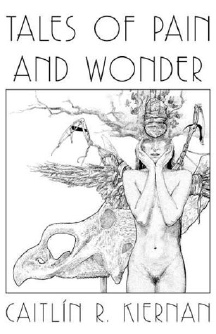 |
|
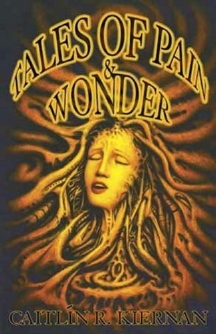 |
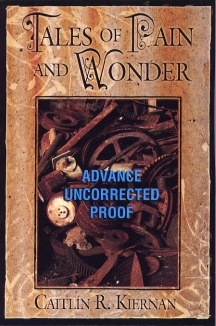 |
| Top,
Gauntlet True First; middle Meisha Merlin TPB ; above, the newest
from Subterreanean Press. |
Caitlin R. Kiernan is,
to put it bluntly, an odd writer. Her work is at once visionary and hyper-real,
shrouded in the supernatural yet anchored
in the gritty evocation of our hardscrabble lives. Reading almost anything
she has written, you might find yourself thinking "Faulker" one
second and "Lovecraft" the next. These are not names or styles
that rest comfortably close beyond those pages penned by Kiernan. Somehow,
in an alchemical reaction that can only come from that unique combination
of talent and originality, Kiernan manages to forge a literary style
that is densely packed with both passionate realistic details and surreal
monsterific imagery. She laces her writing with carefully chosen research,
adding an academic feel. It's true that this sort of writing isn't everybody's
cup of tea. It's not the stuff of slick bestsellers. What Kiernan offers
you is something unmistakably genuine.
Even if it's third generation genuine, as is the case with the forthcoming
'Tales of Pain and Wonder' (Subterranean Press ; March 25, 2008 ; $35).
Take
a look at the pre-order web page and note that everything else by this
author from Subterranean has sold out; if you're inclined to purchase
her work, it's clearly best to do so early. Especially with a volume that
has such a rich history. 'Tales of Pain and Wonder' first appeared on the
scene in 2000, from Gauntlet Press, sporting a cover image by Richard Kirk,
who also did the interior illustrations. Now I love the stuff that Gauntlet
does, but it tends to be a bit pricey – even for me – and more
importantly, tends to sell out like instantly. At this moment, the least
you'll pay for a Gauntlet first is somewhere north of a hundred bucks;
and you could pay quite a bit more should you feel the need.
The next appearance of the book was a 2002 trade paperback edition by Meisha
Merlin. I have to confess that I see Meisha Merlin booths at the conventions
regularly, and the books – at least laying out on a table – look
fine enough. I kind of like the cover here because the image is a monster,
right? Sure. And I'm not opposed to garish either. But garish is better
suited to say, Neal Asher, or, er, James Herbert than Caitlin R. Kiernan.
And my take would be that the sort of reader who would be attracted to
that cover would likely be disappointed with the fiction behind it unless
they had a fairly diverse reading palette. That said, it's still out there
and fairly affordable. The editions have the illustrations by Richard Kirk
from the Gauntlet edition; why the original cover image wasn't used is
a mystery to me. So all said and done, if you want a five-year old trade
paperback version with a cringe-worthy cover, it's out there.
The latest version from Subterranean Press a new cover by Kirk, and original
illustrations that are reproduced, we are told from high-quality scans
of the original artwork, long since sold to collectors. It also includes
a new story not found in the other two versions, 'Salammbo Redux'. In an
introduction to this new edition, Kiernan admits that, "I have allowed
myself a certain degree of revision during the two months I spent editing
this edition of the collection." That includes the decision to elide
the story "Angel You Can See Through." As a result, you can find, "This
edition of Tales of Pain and Wonder has been designated by the author as
the "Remastered" Definitive Text," rounding off the colophon
page. At least she seems certain about this. At $35 for a Deluxe Hardcover
edition, it seems like a bargain to me.
And this brings me round to a bit of a rant on the import of keeping works
in print. I touched on this last week, but it can't be said too often that
genre fiction, like all literature, needs must be kept in print and readily
available to new generations of readers. And where a third edition like
this one, nicely printed, bound, and illustrated becomes available, it's
best not to worry about first/firsts. 'Tis better to have the reading experience
than none at all. And if nought else, should you find yourself with a lightly
read first/first, here's your chance to get a reading copy with altered
text, an extra story and nice production values to boot for a comparative
pittance. That 'Tales of Pain and Wonder' is available is itself a tale
of pain and wonder. I've told you that tale to the best of my meager abilities.
You are about to complete one reading experience, and it is suggested you
embark upon another, very different, soon; but apparently not until next
year!
|
Agony Column Podcast News Report : Karen Joy Fowler Reads at SF in SF : "The
Last Worders"
|
|
| Karen
Joy Fowler photographed by Laurie Roberts. |
We're finishing up the rounds of SF
in SF podcasts carefully, oh so carefully.
In that I am considering the order of the podcast to ensure the best
effect for listeners. So this week's 'cast starts off with Karen
Joy Fowler reading 'The Last Worders'. My take is that it is best to encounter
the fiction fresh, and then hear the analysis and discussion after the
fact. Do I need to remind you that Fowler is a powerful, skilled writer
with a great sense of humor? You can just
listen to the MP3 file here to get a perfect example. Fowler's also a great reader, which helps matters
considerably. We'll follow this up with the interview she and I did tomorrow
and the panel discussion on Thursday, so stay tuned, or at least, do
yourself a favor and listen in order of the podcast. Make sure that the
authors, not the critics, have the last word.
|
| |
|
11-26-07: A 2007 Interview With Andrew Szasz
|
"You're not
getting the kind of protection that you think you're getting"
|
Shopping,
eco-shopping and freako-eco-economics.
|
When he appeared at
Capitola Book Café last Tuesday, I took the
opportunity to speak with Andrew Szasz, author of 'Ecopopulism' 'about
his new book, 'Shopping Our way to Safety'. He's an engaging, intelligent
speaker who has found a fascinating and timely subject with some uncomfortable
implications. We like discomfort here at The Agony Column, so Szasz fit
right in. Szasz's 'Shopping Our way to Safety' examines our current fixations
with all things organic, clean and healthy and uncovers what he calls "an
inverse quarantine" approach to the clear and present dangers that
are brewing the in the world that surrounds us. Szasz is a fascinating
writer who is unafraid to question not just the environmental movement,
but more importantly – himself. You see, his theory of an inverse
quarantine is a great description the problems with bottled water. But
it doesn't pan out in the same manner when you analyze the organic food
business, and Szasz is eager to explain why. You can hear him do so on
this MP3 or this
RealAudio file. And, yes, we did talk about fallout
shelters again and at length. Talk about Boom!
|
| |
|
|
